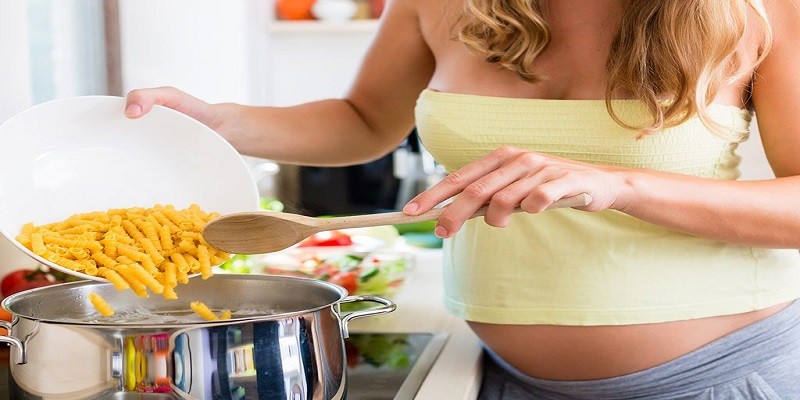Yes, you can eat cold pasta while pregnant, provided it has been prepared and stored properly to avoid any risk of bacterial contamination. Ensuring that all ingredients are fresh and the pasta is refrigerated promptly can make it a safe and nutritious option during pregnancy.
Pregnancy often brings about numerous dietary concerns and questions, one of which is whether it is safe to consume cold pasta. This article aims to provide a comprehensive guide on the safety, nutritional value, risks, and precautions associated with eating cold pasta during pregnancy.
What is Cold Pasta?
Cold pasta refers to pasta that has been cooked, cooled, and often mixed with other ingredients to create dishes like pasta salads. It is a popular choice for quick meals and picnics. The cooling process can alter the starch structure in pasta, potentially offering some health benefits, such as increased resistant starch content, which can aid in digestion and blood sugar control.
Nutritional Value of Cold Pasta
| Nutritional Value | Details |
|---|---|
| Carbohydrates | Provides energy, essential for both mother and baby. |
| Fiber | Whole grain pasta offers higher fiber content, aiding in digestion. |
| Vitamins | Contains B vitamins, iron, and folate, crucial for fetal development. |
| Protein | Often combined with protein-rich ingredients like chicken or chickpeas. |
| Resistant Starch | Cooling pasta increases resistant starch, beneficial for gut health. |
Risks of Eating Cold Pasta During Pregnancy
| Risks | Details |
|---|---|
| Bacterial Contamination | Improper storage can lead to bacterial growth, such as Listeria. |
| High Sodium Content | Some pasta salads may contain high-sodium ingredients, which can affect blood pressure. |
| Allergens | Ingredients like dairy or certain vegetables may cause allergic reactions. |
| Digestive Issues | Some women may experience bloating or heartburn after consuming pasta. |
Safe Ways to Eat Cold Pasta During Pregnancy
To safely enjoy cold pasta during pregnancy, ensure it is prepared with fresh ingredients and stored in the refrigerator within two hours of cooking. Use pasteurized dairy products and avoid raw or undercooked ingredients. Reheat leftovers until steaming hot if you prefer to eat them warm, ensuring they reach an internal temperature of 165°F (74°C).
Alternatives to Cold Pasta During Pregnancy
| Alternatives | Precautions |
|---|---|
| Whole Grain Pasta | Opt for whole grain to increase fiber intake. |
| Quinoa Salad | A high-protein, gluten-free alternative. |
| Vegetable Noodles | Use spiralized vegetables for a low-carb option. |
| Couscous Salad | Ensure it is properly cooked and stored. |
| Lentil Salad | Rich in protein and fiber, but ensure proper storage. |
Experts Tips
- Use Fresh Ingredients: Always use fresh, high-quality ingredients to minimize the risk of contamination (source: FirstCry Parenting).
- Proper Storage: Store cooked pasta in the refrigerator within two hours of preparation to prevent bacterial growth (source: What to Expect Forums).
- Avoid High-Risk Ingredients: Steer clear of unpasteurized cheeses and raw or undercooked meats in your pasta salads (source: MomJunction).
FAQs
Can I eat pasta salad with mayonnaise during pregnancy?
Yes, you can eat pasta salad with mayonnaise if the mayonnaise is pasteurized and the salad is stored properly in the refrigerator.
Is it safe to eat cold pasta from a restaurant while pregnant?
It is generally safer to eat homemade cold pasta, as you can control the ingredients and storage conditions. Restaurant-prepared cold pasta may pose a higher risk of contamination.
How long can I store cold pasta in the refrigerator?
Cold pasta can be safely stored in the refrigerator for up to 3-5 days. Ensure it is kept in an airtight container to maintain freshness and prevent bacterial growth.
Can I eat pasta with raw eggs in the sauce while pregnant?
No, it is not recommended to consume pasta sauces containing raw eggs during pregnancy due to the risk of salmonella. Opt for cooked sauces or use pasteurized egg products.
What are the benefits of eating cold pasta during pregnancy?
Cold pasta can provide essential nutrients like carbohydrates, fiber, and vitamins. The cooling process also increases resistant starch, which can aid in digestion and blood sugar control.
Conclusion
Eating cold pasta during pregnancy can be safe and nutritious if proper precautions are taken. Ensure that the pasta is prepared with fresh ingredients, stored correctly, and consumed within a safe timeframe. By following these guidelines, you can enjoy cold pasta dishes while minimizing any potential risks. Always consult with your healthcare provider if you have specific dietary concerns during pregnancy.
Last Updated on June 1, 2024 by Marjorie R. Rogers, MA (English), Certified Consultant

